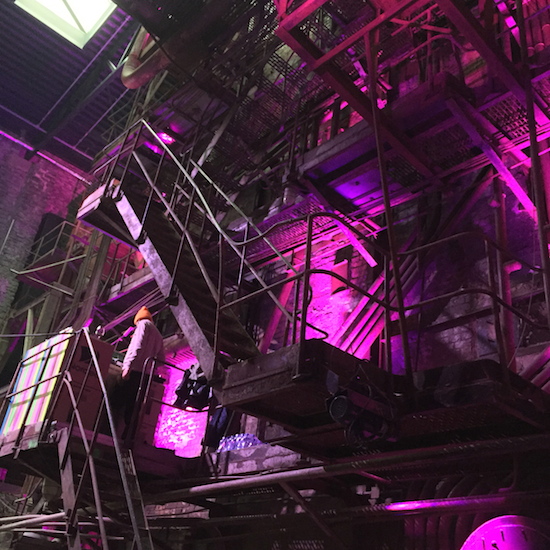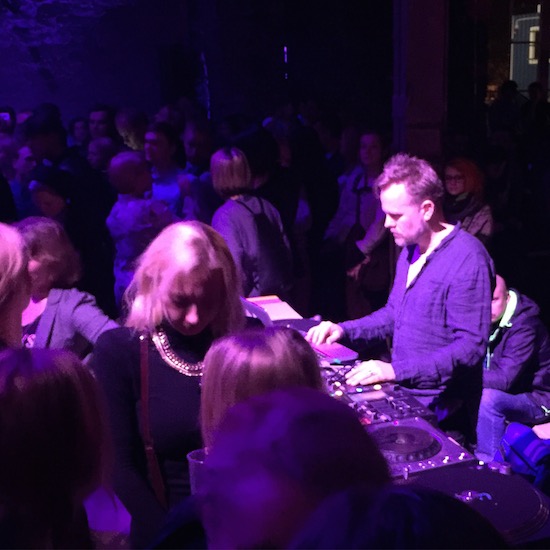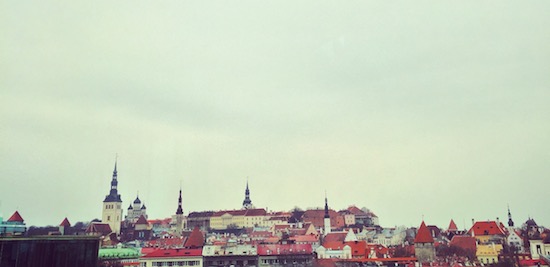Flights make excellent punctuation marks in dally life. When travelling alone, there’s little to do but surrender to the journey; as such, "flight" becomes as much of a state as a process. Far away from quotidian tasks, the bubble that forms around individuals moving through cafés, departure lounges, bus transfers and cramped airplane seats becomes a transient space for reflection and dreaming.
Despite also being pretty dreamy, the Estonian capital of Tallinn feels about as permanent as destinations get. The UNESCO-certified Old Town district is an astonishingly well-preserved medieval city, encircled by majestic stone walls studded with conical red-roofed towers. Its interior is dominated by massive churches that range from the stern austerity of the huge St. Olaf’s to a fantastically gaudy Eastern Orthodox cathedral, both lined by peeling antique houses, colourfully painted streets and roughly cobbled alleys.
All this makes the Old Town an intoxicating setting for the fleeting fun of a music festival. Tallinn Music Week occupies a wide variety of spaces, from the imposing Soviet-era cinema Kino Sōprus to the cosy hub of the Von Krahl Theatre, as well as the city’s many bars, clubs and concert halls. The schedule offers up a diverse musical menu drawn largely from Estonia, the Nordic countries, and the neighbouring Baltic States, from hip hop to contemporary composition to bass, pop and metal. Fittingly, there’s also a strong strand of folk music, reaching back into rare and all-but-forgotten local traditions.

Such is the nature of the festival’s inclusivity that the first night involves a pseudo-Mariarchi troupe The Sexican, who perform heavily Waits-inspired folk-rock donning a dressing-up-box’s worth of Three Amigos castoffs, followed by some impressive free-flowing Danish jazz from Rune Funch Picture Music. Down the street at Kloostri Ait we see twin choirs of traditional dressed ladies and gentlemen belting out Finno-Ugric shanties whilst serving some kind of sherry-like mulled beer out of a bucket.
So far, so diverse, but the first night ends on something of a damp squib in Siinilind with the lamentable pop of Russian boy-band-with-guitars On The Go and retro-rock quartet Elephants From Neptune, who wheel out every riffing, soloing, "let me see those hands" rock-band cliche in the book.
After a day spent wandering Tallinn, we’re ready for the "classical music rave" held in Kultuurikatel, a cavernous converted industrial space with a mess of metal stairs, pipes and machinery hanging from its high ceiling. It’s been decorated in neon for the occasion by well-regarded local designer, artist and musician Marit Ilison, draped in UV sculptures and lit with pink lights that cast tangled shadows through the twisted metal.
We arrive as Icelandic composer-producer-performer Valgeir Sigurðsson is performing. It turns out he’s DJing, reportedly for the first time in his long music career. Valgeir stands almost hidden amongst the teeming crowd, mixing together string squalls, deep drones and bassy noise that seems to come from all directions. The effect is dramatic and disorientating, creating a buzz in the air as the teeming crowd stand wide-eyed amidst the spectacle, happy to be at a classical music rave whilst not being exactly sure what a classical music rave actually is.
Over at Kino Sõprus are All We Are, a slick Liverpudlian trio with a singing drummer centre stage. He beats out steady disco rhythms while the bassist, peeking out from beneath a bouffant blonde mane, steps assuredly from foot to foot, reminiscent of Tina Weymouth of Talking Heads. It’s well-crafted, likeable stuff that gets people moving, even in the mostly-seated cinema venue. Over the road, the charming hole-in-the-wall bar Paar Veini is running a bass music lineup featuring Icelandic producer Futuregrapher, who has seemingly swallowed the history of dance music whole, vomiting it back up as a storming mash of beats, breaks and synths.

The final act of the night is Slowolf, a Danish producer who deftly plays a sample pad as if he’s about to get an all-time high score on Tetris. He’s joined onstage by rapper Felix De Luca, who immediately spends an admirable amount of energy luring the crowd into the palm of his hand. The fresh, creative production mixed with De Luca’s rampant energy make it a festival highlight.
The Tallinn Music Week finale seems to have come around all too quickly. The night passes in a blur of flashing smiles, spinning lasers shot through smoke, teeming crowds, zigging taxi rides, cracked beams in high ceilings, and festival delegates emptying trays of canapés and fridges of alcohol like a swarm of happy VIP ants. Downstairs at Von Krahl, a guy with a huge didgeridoo instigates a party full of euphoric, flailing drunk people, creating an unexpected Glastonbury-dance-tent moment, while upstairs, sallow hipster troupe Badass Yuki creep onstage with as little enthusiasm as they can muster, running through a set of jerky, disillusioned sadwave. It’s interesting stuff, but their apathy-as-cool mentality feels distinctly out of date as the new millennium reaches its teens. In sharp contrast, Italian duo Joycut create a committed, rhythmic cacophony that’s dubbed "care-core" by one ecstatic audience member. The two pound on dual drum kits, whipping up a storm of noise that touches on darkwave, post-rock and ambient electronica. With Estonian alt-mainstays Kreatiivmootor and Faun Racket both sadly absent from this year’s festival bill, Joycut pick up some of the slack, delivering a blistering and impassioned set.
As the festival’s end credits roll, they’re soundtracked by the cinematic shoe gaze of Holy Motors. Fronted by hypnotic ingenue Eliann Tulve, their heavily stylised spaghetti-Western guitars and languid melodies have a pungent, dreamy shimmer. Afterwards, we pour out into the streets, abuzz with the colours, sounds, sights and tastes of this consummately produced and warmly welcoming festival. As we vanish back into the ether of after-parties, hotel rooms and homeward flights, Tallinn Music Week leaves us basking in a unique afterglow, musical appetites sated and minds lit up by a wave of Baltic creativity.
<div class="fb-comments" data-href="http://thequietus.com/articles/17600-festival-report-tallinn-music-week” data-width="550">


